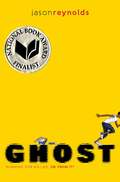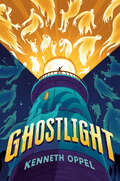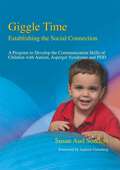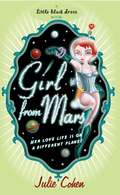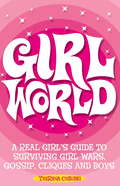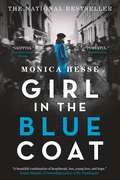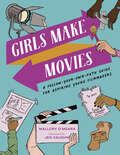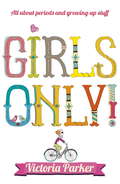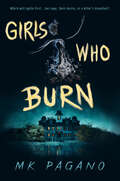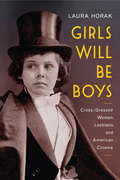- Table View
- List View
Ghost: Ghost; Patina; Sunny; Lu (Track #1)
by Jason ReynoldsA National Book Award Finalist for Young People&’s Literature Nominated as one of America&’s best-loved novels by PBS&’s The Great American Read Ghost wants to be the fastest sprinter on his elite middle school track team, but his past is slowing him down in this first electrifying novel of the acclaimed Track series from Coretta Scott King - John Steptoe Award–winning author Jason Reynolds.Ghost. Lu. Patina. Sunny. Four kids from wildly different backgrounds with personalities that are explosive when they clash. But they are also four kids chosen for an elite middle school track team—a team that could qualify them for the Junior Olympics if they can get their acts together. They all have a lot to lose, but they also have a lot to prove, not only to each other, but to themselves. Running. That&’s all Ghost (real name Castle Cranshaw) has ever known. But Ghost has been running for the wrong reasons—it all started with running away from his father, who, when Ghost was a very little boy, chased him and his mother through their apartment, then down the street, with a loaded gun, aiming to kill. Since then, Ghost has been the one causing problems—and running away from them—until he meets Coach, an ex-Olympic Medalist who sees something in Ghost: crazy natural talent. If Ghost can stay on track, literally and figuratively, he could be the best sprinter in the city. Can Ghost harness his raw talent for speed, or will his past finally catch up to him?
Ghostgirl
by Tonya HurleyIt's the first day of the rest of Charlotte's life. She isn't going to be invisible any more. And she's not going to stop at just getting noticed, she's determined that she'll be envied! Much to Charlotte's surprise her plan actually seems to be working: Petula, the most popular girl at school has finally acknowledged her existence and her lab partner for the rest of the term is none other than Damen Dylan, school heart-throb and object of Charlotte's desire. It's only a matter of time before she's accepted into their elite circle...that is until, in her excitement, Charlotte chokes to death on a gummy bear. So, OK, it's the first day of the rest of Charlotte's death - why should that change her plans?
Ghostgirl: Homecoming
by Tonya HurleyCharlotte may have graduated Dead Ed but that's not the end of her story. Life, for Charlotte, was one bitter disappointment after another. And it seems death isn't going to be much different. Convinced that graduating Dead Ed was her route to the afterlife Charlotte is a little surprised to find she has to complete an internship! Answering the phones at a help centre for troubled teens isn't proving brilliantly exciting. Until Scarlet calls: a pedicure-gone-hideously-wrong has landed Petula in a coma and Scarlet thinks Charlotte is the only person who can help...
Ghostgirl: Lovesick
by Tonya HurleyBefore she can rest in peace, Charlotte Usher must return to the tragic site of her death: High School. On the brink of Dead Ed graduation, Charlotte and her fellow classmates learn they have one last mission to complete before gaining entrance to the much-anticipated afterlife: Observe one designated teen with an unexplained problem and help said-troubled teen by Prom. For the life of her, Charlotte can't imagine why she has been assigned to help Damen, last year's Homecoming King and her former fatal crush. To make matters worse, her boyfriend Eric is sent to look after her best (breathing) friend Scarlet, who has since ditched her goth girl image for a girlier look that turns more heads than just her boyfriend Damen's. Charlotte would die (again) for love. But when her only chance at an afterlife means having to face the dreaded, all-too-familiar pains of being invisible, it may be too much for her to handle.
Ghostlight
by Kenneth OppelGabe&’s summer job scaring tourists with ghost stories turns terrifyingly real when he accidentally summons the spirit of a dead girl—and must join forces with her to protect the world of the living. A new story by award-winning author Ken Oppel for ages 10 and up.The story of the tragic death of sixteen-year-old Rebecca Strand and her lighthouse keeper father is just an elaborate tale Gabe tells tourists for his summer job on Toronto Island. Or so he thought. When his ghost tours awaken Rebecca&’s spirit, Gabe is drawn into a world far darker than any ghost story he&’s ever heard. Rebecca reveals that she and her father were connected to the Order, a secret society devoted to protecting the world from "the wakeful and wicked dead"—malevolent spirits like Viker, the ghost responsible for their deaths. But now the Order has disappeared and Viker is growing even stronger, and he&’ll stop at nothing to wreak chaos and destruction on the living.Gabe and his friends—both living and dead—must find a way to stop Viker before they all become lost souls.
Ghosts (Hex #3)
by Rhiannon LassiterThe exhilarating final blast of the Hex trilogy, the laser-powered sci-fi thriller, by a talented young writer.The city is a dangerous place for Hexes. The security forces are on the alert for any sign of Hex activity-any sign of a mutant presence. The Hex gene will soon be extinct.But in the depths of the city, a powerful new force is taking shape. Led by the Hex Raven, a rabble army is planning a new future -- they're coming out of hiding. But the source of their strength, the computer system itself, harbors a devastating enemy....
Ghostsmith (House of the Dead Duology #2)
by Nicki Pau PretoIn this action-packed finale to the House of the Dead Duology, Wren and her friends put everything they know to the test as they battle the living and the undead to save their world.Wren is still reeling from the revelation that the mother she thought was dead is actually the Corpse Queen, a ghostsmith with the terrifying power to control the undead. It was Wren&’s own mother who created the iron revenants—an army of near unbeatable undead soldiers. When the iron revenants attack, no one in the Dominions will have the strength to stand in their way. Now Wren, Leo, and Julian find themselves once more in the Breach, this time on the run from Wren&’s father, who is determined to secure more power for himself and the House of Bone. The three are desperate to stop the upcoming war, but working together is easier said than done with Julian still furious about Wren double-crossing him. And to make matters worse, Wren is plagued by powerful new abilities that force her to reassess everything she knows about being a bonesmith. When Wren&’s long-lost twin brother shows up and vows to help her destroy the well of magic that feeds the iron revenants, she must decide if trusting him is worth potentially playing right into their mother&’s hands. After all, the dead might be dangerous, but it&’s the living who can betray you.
Giant Pandas: Biology and Conservation
by Donald LindburgThis book tells the promising story of how the giant panda returned from the brink of extinction. The most important sourcebook on giant pandas to date, it is the first book since 1985 to present current panda research and the first to place the species in its biological, ecological, and political contexts.
Giddy Barber Explodes in 11
by Dina HavranekThe hilarious and heartening story of a teen girl who makes several astonishingly terrible decisions in an effort to find the support she needs.Giddy Barber knows with certainty she&’s going to become a mechanical engineer. What she doesn't know is the last time she smiled.With her parents overworked and unavailable, it falls to Giddy to make sure her siblings stay on track. But she&’s exhausted. When you&’re the person everyone else turns to, what do you do when you hit a wall?Giddy finds an answer online—if you can&’t handle how things are going, shake them up. Is it sound advice? Unclear. But is Giddy willing to try anything? Absolutely. Putting eleven days on the clock, she&’ll change her routine. But soon it becomes clear that some problems are bigger than what an online column can fix—her family is fracturing, her anxiety is mounting, and all she knows is this: Something. Has. To. Give.In Dina Havranek&’s Giddy Barber Explodes in 11, a long-time teacher dives into the issues of depression, overwork, and lack of support many of her students are dealing with. In a results-obsessed society, how much are we demanding of teens? And what happens when their burdens become too much?
Giddy Up, Li'l Buckaroos!
by Mark IacolinaBuckaroos ride. Buckaroos wrangle. Buckaroos spurs go jingle jangle. This rollicking, rhyming book will have young cowboys and girls eager to pull on their boots, put on their hats, and saddle up. With his trusty dog by his side, this little buckaroo goes riding through a rootin tootin day filled with action, fun, and even a first place prize!
Giggle Time - Establishing the Social Connection: A Program to Develop the Communication Skills of Children with Autism
by Susan Aud SondersGiggle Time is a step-by-step program for parents, teachers and other professionals to help develop the non-verbal, verbal and social reciprocity skills of children with autism. It describes in accessible detail how to communicate with children with autism and gives clear instructions on "how to" techniques for developing language skills. Specifically addressing developmental delays, Giggle Time helps to lay the necessary framework for future language growth by turning the actions the child initiates into interactions with meaning. This is a user-friendly guide, packed full of fun and child-centered exercises that can be carried out at home or in the classroom.
Gilded in Vengeance
by Lyssa Mia SmithRevenge meets the Gilded Age in this thrilling YA fantasy set among the glittering magical elite of late-1800s New York society, from Revelle author Lyssa Mia Smith.Two girls attended a magical ball, but one was never seen again.At least that’s what those who betrayed her believed.Two years after being framed for fraud by the Society of the Charmed, an exclusive club of New York’s wealthiest—and most magical—citizens, Emmy Vallillo wastes away in prison, utterly alone.Until her cell door bursts open, revealing Jack Fontaine, one of the Society’s favorite sons, now imprisoned for a crime he swears he didn’t commit. They make a deal: He’ll help Emmy escape if she helps destroy those who’ve wronged them.Together, the two break free and, using Emmy’s magic to transform their appearances, they soon become the Society’s new darlings.Now their enemies want to dine with them. Attend lavish balls with them. Marry them. But ruining lives requires Emmy to trust Jack with hers, despite his dark secrets—and the infuriating attraction between them.When another betrayal brings their enemies to their doorstep, Emmy must choose: finish exacting revenge, or give up the money, the magic, and her safety in this cutthroat world for the most treacherous thing of all—love.
Gingerbread
by Rachel Cohn"I have promised to be a model citizen daughter....I have confined my Shrimp time to making out with him in the Java the Hut supply closet and quick feels on the cold hard sand at the beach during our breaks, but enough is enough....Delia and I are planning a party at Wallace and Shrimp's house and I am spending the night whether Sid and Nancy notice or not. I will be as wild as I wanna be."After being kicked out of a fancy New England boarding school, Cyd Charisse is back home in San Francisco with her parents, Sid and Nancy, in a household that drives her crazy. Lucky for Cyd, she's always had Gingerbread, her childhood rag doll and confidante.After Cyd tests her parents' permissiveness, she is grounded in Alcatraz (as Cyd calls her room) and forbidden to see Shrimp, her surfer boyfriend. But when her incarceration proves too painful for the whole family, Cyd's parents decide to send her to New York to meet her biological father and his family, whom Cyd has always longed to know.Summer in the city is not what Cyd Charisse expects -- and Cyd isn't what her newfound family expects, either.With Gingerbread, debut author Rachel Cohn creates a spirited world of in-your-face characters who are going to stay with readers for a long time.
Girl From Mars
by Julie CohenA truly out-of-this-world romance from Little Black Dress star Julie Cohen I, Philomena Desdemona Brown, do solemnly swear to forsake all romantic relationships... It's not like the vow, made by Fil and her three nerdy male best friends, seemed much of a big deal at the time. Frankly, Fil wouldn't know romance if it hit her in the face, and with her real love being her artist job at Girl from Mars, the comic whose heroine has never had a love interest, she doesn't exactly mind being relationship-free anyway. Until her world is rocked to its core when one of her long-standing quartet and Girl from Mars herself both unexpectedly fall in love. Is it time to give in to temptation and finally fall in love?
Girl Wonder
by Alexa MartinIt's senior year and Charlotte Locke has just transferred to a new high school. With no friends, a terrible math SAT score, and looming college application deadlines, the future starts to seem like a black hole.Then Amanda enters her orbit like a hot-pink meteor, offering Charlotte a ticket to popularity. Amanda is fearless, beautiful, and rich. As her new sidekick, Charlotte is brought into the elite clique of the debate team-and closer to Neal, the most perfect boy she has ever seen.Senior year is finally looking up. . . .or is it? The more things heat up between Charlotte and Neal, the more he wants to keep their relationship a secret. Is he ashamed? Meanwhile, Amanda is starting to act strangely competitive. Could Charlotte's new BFF be hiding something?A riveting debut novel full of magnetic characters, romantic intrigue, and dark humor, Girl Wonder is a poignant story of first love, jealousy, and friendship that will keep readers rooting for Charlotte until the very end.
Girl World: A Real Girl's Guide to Surviving Girl Wars, Gossip, Cliques and Boys
by Theresa CheungIt's tough out there in Girl World. One minute you're in the gang, the next you're out... your best friend has stopped talking to you for no apparent reason... you find out that someone has been spreading nasty rumours about you... a girl is making your life a misery by picking on you... and everyone seems to be so much cooler and confident than you. What's a girl to do?Girl World lets you into the secret and complicated world of girls and their friendships. It shows you how you can survive the scary girl, the snob, the gossip, the joker and the backstabber. Packed with straightforward and sensible advice Girl World will help girls deal with everyday situations and gain real confidence. It makes sense of the sometimes bewildering and unpredictable behaviour of girls and gives the reader the courage to stand up for themselves and hold their head high. As a former secondary school teacher, the author, Theresa Cheung, has seen for herself just how powerful girls' friendships and cliques are - shaping what they wear and say, how they feel about school, how they respond to boys and how they feel about themselves.This is an absolute must for girls everywhere!
Girl in a Bad Place
by Kaitlin WardThe Haven, a commune in the mountains, seems harmless -- until Mailee's best friend Cara decides she's going to stay there forever. How far will Mailee go to bring her friend home?Mailee and Cara take care of each other. Mailee is the star of the high school plays; Cara is the stage manager. Mailee can't keep her life together; Cara has enough organizational skills for the both of them.So when the girls are invited to visit the Haven, a commune in the mountains near their suburban Montana homes, it seems like an adventure. Until Cara starts spending every waking minute there ... and Mailee thinks it's creepy, almost like a cult. When Cara decides she's going to move to the Haven permanently, Mailee knows it's a bad idea. But how far will she go to save her best friend ... from herself?
Girl in the Blue Coat
by Monica HesseThis bestselling and award-winning novel about a teenage girl in Nazi-occupied Amsterdam speaks powerfully to the realities of grief, heartbreak, and bravery, perfect for fans of Kristin Hannah and Ruta Sepetys. Amsterdam, 1943. Hanneke spends her days procuring and delivering sought-after black market goods to paying customers, her nights hiding the true nature of her work from her concerned parents, and every waking moment mourning her boyfriend, who was killed on the Dutch front lines when the Germans invaded. She likes to think of her illegal work as a small act of rebellion. On a routine delivery, a client asks Hanneke for help. Expecting to hear that Mrs. Janssen wants meat or kerosene, Hanneke is shocked by the older woman's frantic plea to find a person—a Jewish teenager Mrs. Janssen had been hiding, who has vanished without a trace from a secret room. Hanneke initially wants nothing to do with such dangerous work, but is ultimately drawn into a web of mysteries and stunning revelations that lead her into the heart of the resistance, open her eyes to the horrors of the Nazi war machine, and compel her to take desperate action. Beautifully written, intricately plotted, and meticulously researched, Girl in the Blue Coat is an extraordinary novel about courage, grief, and love in impossible times.
Girl in the Kitchen: How a Top Chef Cooks, Thinks, Shops, Eats, and Drinks
by Heather Shouse Stephanie Izard“Exudes a down-to-earth vibe. Packed with creative recipes constructed from fresh seasonal produce . . . accessible and inspiring at the same time.” —HuffPostStephanie Izard knows how to inspire, captivate, and cook up a storm. Fan favorite and the first and only woman to win on TV’s Top Chef, she’s also the chef and owner of the acclaimed Girl & the Goat restaurant in Chicago. Girl in the Kitchen collects more than one hundred of Izard’s best recipes, from innovative appetizers like Asian-Spiced English Peas to luscious desserts like Quince and Fig Cobbler with Vanilla Mascarpone. Beautifully photographed and bursting with flavor, personality, and insights into the top chef’s process—including where she finds her cooking muses, how she shops for food, and which beers and wines she chooses to accompany her meals—this book represents the culmination of a craft and provides inspiration that reaches far beyond the kitchen walls.“A cookbook that should make anyone comfortable in the kitchen. The photos by Dan Goldberg are lush, and tips throughout cover techniques, ingredients, and wine or beer pairings for each dish. Izard wants her readers to have fun and even invites them to change up the recipes—just the way a professional chef does.” —Chicago magazine“Stephanie’s book is not only one of the most visibly appealing and beautiful cookbooks I’ve seen in a very long time, it’s also filled with awesome creative recipes that are sensible (like her). Stephanie is an amazing chef, an immense talent and a wonderful woman.” —Michelle Bernstein, James Beard Award–winning chef
Girlhood: Teens around the World in Their Own Voices
by Masuma AhujaWhat does a teenage girl dream about in Nigeria or New York? How does she spend her days in Mongolia, the Midwest, and the Middle East? All around the world, girls are going to school, working, dreaming up big futures—they are soccer players and surfers, ballerinas and chess champions. Yet we know so little about their daily lives. We often hear about challenges and catastrophes in the news, and about exceptional girls who make headlines. But even though the health, education, and success of girls so often determines the future of a community, we don&’t know more about what life is like for the ordinary girls, the ones living outside the headlines. From the Americas to Europe to Africa to Asia to the South Pacific, the thirty teens from twenty-seven countries in Girlhood share their own stories of growing up through diary entries and photographs, and the girls&’ stories are put in context with reporting and research that helps us understand the circumstances and communities they live in. This full-color, exuberantly designed volume is a portrait of ordinary girlhood around the world, and of the world, as seen through girls&’ eyes.
Girls Like Her
by Melanie SumrowA raw, gripping, authentic, and boldly original novel about a fifteen-year-old Texas girl set to stand trial for murder—and the one person who might be able to help her clear her name.A wealthy businessman is dead, and fifteen-year-old Ruby Monroe is in a Dallas jail awaiting trial for his murder. Ruby has no one she can count on—no one, except her state-appointed caseworker, a woman named Cadence Ware. In Ruby’s experience, that’s not anyone she can trust.Cadence is familiar with the cold reality of Ruby’s situation, even before Ruby was arrested. Angry and alone, homeless and hungry, breaking the law just to survive, she is the kind of girl no one wants to listen to, especially not the prosecutor who wants to put her away for life. But no one knows the story—the real story—of what happened the day Ruby met the man who would end up dead. As the layers of truth are peeled away and time is running out, Ruby and Cadence will both have desperate choices to make—choices that could mean the difference between Ruby spending her life in prison or her name being cleared.Told through a collection of letters, meeting notes, news articles, court transcripts, and more, Girls Like Her is a riveting and unflinching tale of the truths so often lost in the American justice system, and one girl’s fight to be heard.
Girls Make Movies: A Follow-Your-Own-Path Guide for Aspiring Young Filmmakers
by Mallory O'MearaMake your own movie from start to finish with this entertaining, practical choose-your-path nonfiction guide to the world of filmmaking, from the critically acclaimed author of The Lady from the Black Lagoon. <p><p>Girls belong in the world of filmmaking. While we see them acting on-screen, there are also countless women working every single job possible behind the scenes as part of the film's crew. Are you a girl who is interested in film making? Do you wonder how you actually make a movie? Well, this is the book for you. <p><p>Girls Make Movies puts you in the driver'’s seat as you create a fictitious zombie blockbuster and are guided through each stage of production and learn about the processes, techniques, and people involved in making a Hollywood hit. Luckily, every path through this nonfiction book results in the film being made, but you will be asked to make choices that will affect the outcome of the movie. Will you shoot on location or on a studio lot? Use practical or special effects? Hire a greensperson or a someone to do pyrotechnics? The choices are up to you! <p><p>Written by critically acclaimed author Mallory O'Meara and paired with eye-catching, graphic illustrations by popular comic book artist Jen Vaugh, this unique, practical book provides young girls with advice and inspiration while offering a sense of adventure as they learn how to create a movie!
Girls Only!: All about periods and growing-up stuff
by Victoria ParkerGirls Only! focuses on the practicalities of periods, the social and personal implications of starting your period, and the physical and emotional developments in puberty. It tells you what happens and when, what you need to know and how to prepare. It answers all the questions girls are dying to ask, but daren't, in a clear, friendly way, using real-life examples. It's the perfect first book about periods for girls of primary school age as it provides information at the right level. The tone is positive and reassuring and complemented by quirky illustrations throughout.
Girls Who Burn
by MK PaganoJessica Goodman meets Jesse Q. Sutanto in this twisty enemies-to-lovers thriller, full of secrets, privilege, and murder.Eighteen-year-old Addie Blackwood regrets nothing more than one horrible, mistake-filled night last summer. Hours after she hurled the worst words she could think of at her sister, Fiona was found dead at the bottom of a ravine. The police ruled her death an accident, but Addie&’s never bought it. Her ballet-prodigy sister didn&’t slip and fall; she was pushed. And Addie&’s number one suspect: Thatcher Montgomery, the rich kid down the street who always had a thing for Fiona.But when Thatcher is found dead in the same ravine, Addie must admit she was wrong. And now her only ally (and alibi) in catching the real killer is none other than her childhood rival, Seth Montgomery—Thatcher&’s cousin and the boy she&’s always loved to hate. Arguing with Seth is easy; working with him without thinking of that night last summer, near impossible.As Addie and Seth dodge corrupt police and his even more corrupt family, their investigation pulls them closer than ever before. But as they approach the explosive and murderous truth, their growing bond may not be enough to keep Addie safe—in fact, it may turn her into the next victim.
Girls Will Be Boys
by Laura HorakMarlene Dietrich, Greta Garbo, and Katharine Hepburn all made lasting impressions with the cinematic cross-dressing they performed onscreen. What few modern viewers realize, however, is that these seemingly daring performances of the 1930s actually came at the tail end of a long wave of gender-bending films that included more than 400 movies featuring women dressed as men. Laura Horak spent a decade scouring film archives worldwide, looking at American films made between 1908 and 1934, and what she discovered could revolutionize our understanding of gender roles in the early twentieth century. Questioning the assumption that cross-dressing women were automatically viewed as transgressive, she finds that these figures were popularly regarded as wholesome and regularly appeared onscreen in the 1910s, thus lending greater respectability to the fledgling film industry. Horak also explores how and why this perception of cross-dressed women began to change in the 1920s and early 1930s, examining how cinema played a pivotal part in the representation of lesbian identity. Girls Will Be Boys excavates a rich history of gender-bending film roles, enabling readers to appreciate the wide array of masculinities that these actresses performed--from sentimental boyhood to rugged virility to gentlemanly refinement. Taking us on a guided tour through a treasure-trove of vintage images, Girls Will Be Boys helps us view the histories of gender, sexuality, and film through fresh eyes.
